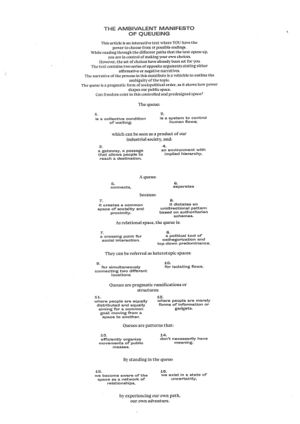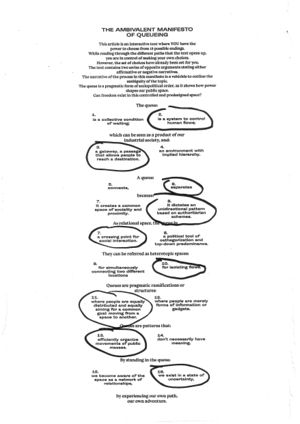The Ambivalent Manifesto of Queueing: Difference between revisions
No edit summary |
No edit summary |
||
| Line 7: | Line 7: | ||
''This article is an interactive text where YOU have the | ''This article is an interactive text where YOU have the | ||
power to choose from 18 possible endings. | ''power to choose from 18 possible endings.'' | ||
While reading through the different paths that the text opens up, | ''While reading through the different paths that the text opens up,'' | ||
you are in control of making your own choices. | ''you are in control of making your own choices.'' | ||
However, the set of choices have already been set for you. | ''However, the set of choices have already been set for you.'' | ||
The text contains two series of opposite arguments stating either | ''The text contains two series of opposite arguments stating either'' | ||
affirmative or negative narratives. | ''affirmative or negative narratives.'' | ||
The narrative of the process in this manifesto is a vehicle to outline the ambiguity of the topic. | ''The narrative of the process in this manifesto is a vehicle to outline the ambiguity of the topic.'' | ||
The queue is a pragmatic form of sociopolitical order, as it shows how power shapes our public space. | ''The queue is a pragmatic form of sociopolitical order, as it shows how power shapes our public space.'' | ||
Can freedom exist in this controlled and predesigned space?'' | ''Can freedom exist in this controlled and predesigned space?'' | ||
The queue is a system to control human flows, which can be seen as a product of our industrial society, and a gateway, a passage that allows people to reach a destination. | The queue is a system to control human flows, which can be seen as a product of our industrial society, and a gateway, a passage that allows people to reach a destination. | ||
Latest revision as of 11:22, 11 March 2017
Workshop with The Serving Library,
In collaboration with Franc
THE AMBIVALENT MANIFESTO OF QUEUEING.
This article is an interactive text where YOU have the power to choose from 18 possible endings. While reading through the different paths that the text opens up, you are in control of making your own choices. However, the set of choices have already been set for you. The text contains two series of opposite arguments stating either affirmative or negative narratives. The narrative of the process in this manifesto is a vehicle to outline the ambiguity of the topic. The queue is a pragmatic form of sociopolitical order, as it shows how power shapes our public space. Can freedom exist in this controlled and predesigned space?
The queue is a system to control human flows, which can be seen as a product of our industrial society, and a gateway, a passage that allows people to reach a destination. A queue separates because it dictates an unidirectional pattern based on authoritarian schemes. As relational space, the queue is a crossing point for social interaction. They can be referred as heterotopic spaces for isolating flows. Queues are pragmatic ramifications or structures where people are equally distributed and equally aiming for a common goal: moving from a space to another. Queues are patterns that efficiently organize movements of public masses. By standing in the queue we exist in a state of uncertainty, by experiencing our own path, our own adventure.


